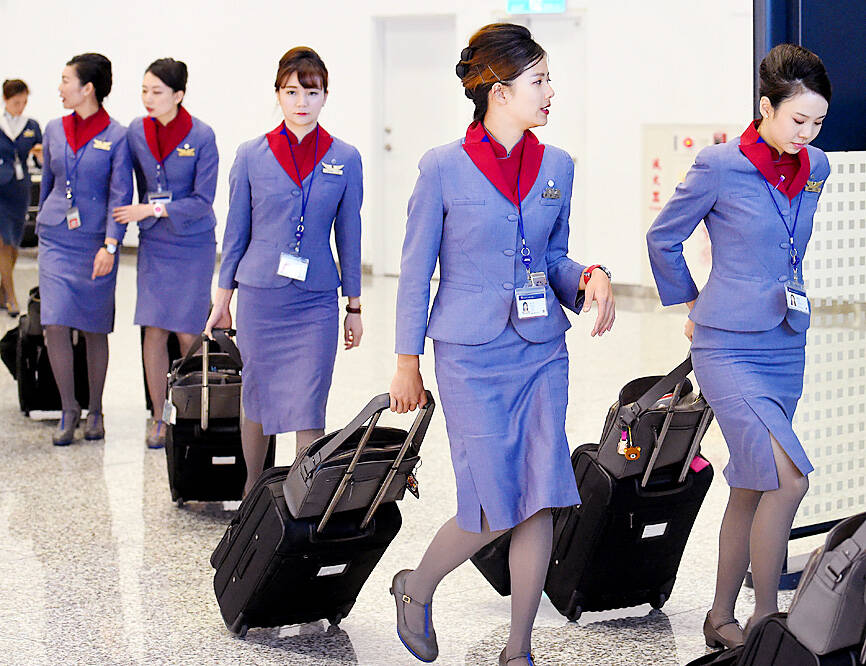Airline companies’ appearance requirements obliging female flight attendants to wear pencil skirts and high heels are discriminatory, and they should be able to have the option to wear pants, the National Human Rights Commission said in a report yesterday.
Completing a year-long probe, commission members said the uniform requirements of Taiwan’s air carriers contravened the UN Convention on the Elimination of All Forms of Discrimination Against Women (CEDAW).
To fight gender-based discrimination, government agencies should issue guidelines and require airlines to make changes so that female flight attendants have the option to wear pants, the report said.

Photo: Chu Pei-hsiung, Taipei Times
The Taoyuan Flight Attendants’ Union in August last year filed a complaint with the commission about the issue.
“Airline companies’ uniform requirements are discriminatory and they also negatively affect flight attendants’ ability to handle emergency situations, putting them in danger and at risk of exposing parts of their bodies,” the union said.
The commission said that its probe found that airline companies have differences in their uniform requirements for male and female attendants, with the female dress code being more demanding.
“Requirements for female attendants are disadvantageous to them at work and discriminatory, contravening provisions under CEDAW,” it said.
During their training, flight attendants wear pants, so they have no experience of handling emergency situations while in a skirt, it added.
Requiring female flight attendants to wear pencil skirts and high heels increases the risk of their objectification and being sexually harassed, it said, adding that such uniforms make them more prone to fall and are more susceptible to catching fire,
Commission members also suggested that the Gender Equality in Employment Act (性別平等工作法) be amended.
Meanwhile, some major local airlines, including EVA Air, China Airlines and Starlux Airlines, released press statements saying that they would consult with flight attendants to find out their needs regarding the dress code and work conditions, and evaluate necessary changes.

The Coast Guard Administration (CGA) yesterday said it had deployed patrol vessels to expel a China Coast Guard ship and a Chinese fishing boat near Pratas Island (Dongsha Island, 東沙群島) in the South China Sea. The China Coast Guard vessel was 28 nautical miles (52km) northeast of Pratas at 6:15am on Thursday, approaching the island’s restricted waters, which extend 24 nautical miles from its shoreline, the CGA’s Dongsha-Nansha Branch said in a statement. The Tainan, a 2,000-tonne cutter, was deployed by the CGA to shadow the Chinese ship, which left the area at 2:39pm on Friday, the statement said. At 6:31pm on Friday,

The Chinese People’s Liberation Army Navy’s (PLAN) third aircraft carrier, the Fujian, would pose a steep challenge to Taiwan’s ability to defend itself against a full-scale invasion, a defense expert said yesterday. Institute of National Defense and Security Research analyst Chieh Chung (揭仲) made the comment hours after the PLAN confirmed the carrier recently passed through the Taiwan Strait to conduct “scientific research tests and training missions” in the South China Sea. China has two carriers in operation — the Liaoning and the Shandong — with the Fujian undergoing sea trials. Although the PLAN needs time to train the Fujian’s air wing and

Taiwanese celebrities Hank Chen (陳漢典) and Lulu Huang (黃路梓茵) announced yesterday that they are planning to marry. Huang announced and posted photos of their engagement to her social media pages yesterday morning, joking that the pair were not just doing marketing for a new show, but “really getting married.” “We’ve decided to spend all of our future happy and hilarious moments together,” she wrote. The announcement, which was later confirmed by the talent agency they share, appeared to come as a surprise even to those around them, with veteran TV host Jacky Wu (吳宗憲) saying he was “totally taken aback” by the news. Huang,

The American Institute in Taiwan (AIT) put Taiwan in danger, Ma Ying-jeou Foundation director Hsiao Hsu-tsen (蕭旭岑) said yesterday, hours after the de facto US embassy said that Beijing had misinterpreted World War II-era documents to isolate Taiwan. The AIT’s comments harmed the Republic of China’s (ROC) national interests and contradicted a part of the “six assurances” stipulating that the US would not change its official position on Taiwan’s sovereignty, Hsiao said. The “six assurances,” which were given by then-US president Ronald Reagan to Taiwan in 1982, say that Washington would not set a date for ending arm sales to Taiwan, consult